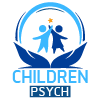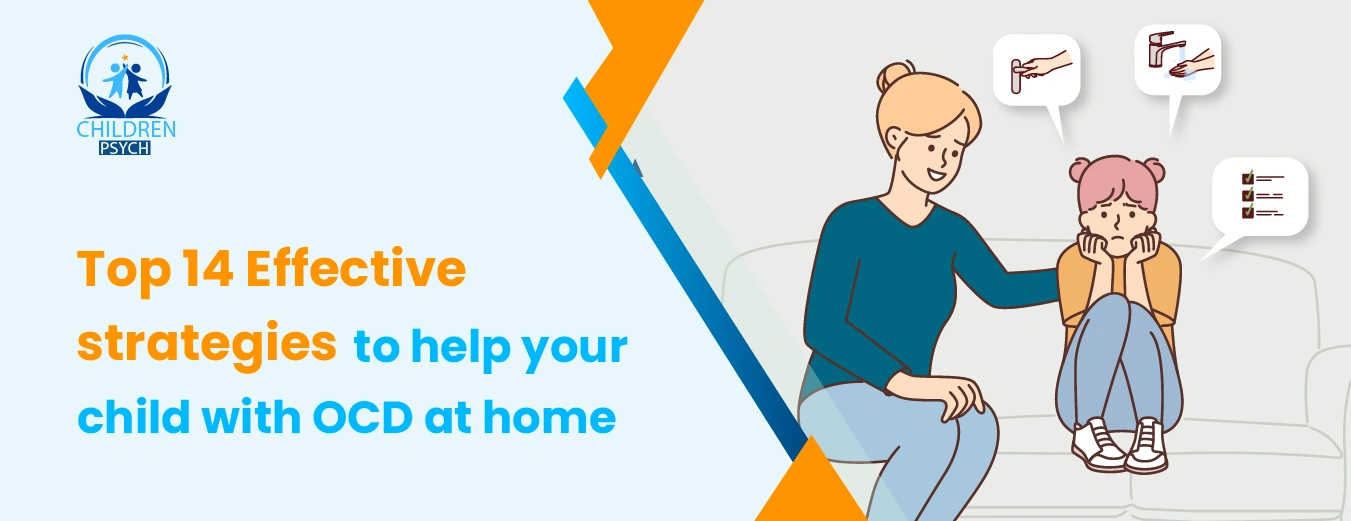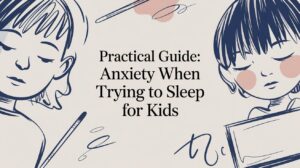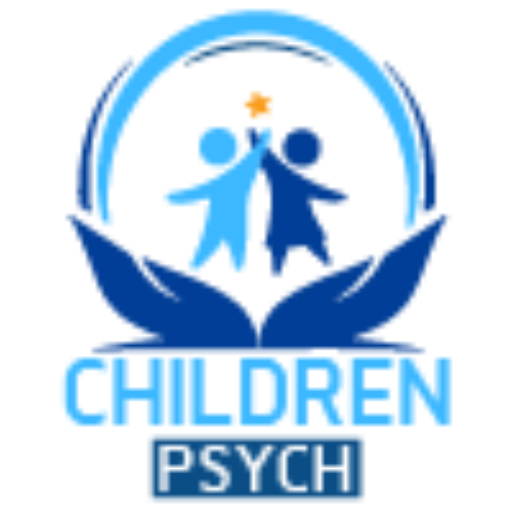Key Points
- Parents and caregivers are the first observers of their child’s behavior, so they can better help their child in overcoming obsessive thoughts and compulsions.
- Give your child some rewards to reinforce their positive behavior.
- Do not perform those actions or show behavior that encourages OCD in your child.
- If you think that you are unable to help your child, then immediately seek professional help.
How many times have you noticed your child is showing some distinct eating behavior, counting a specific thing multiple times, and washing hands in regular and repeated intervals? Your child might be struggling with Obsessive-compulsive disorder. You should consider this immediately if your child is taking excessive stress and these symptoms are interfering with their life. Remember that parents or caregivers play a major role in the OCD treatment of their children.
This article will help you learn the top ways that you can use to help your child overcome OCD and live a healthy and prosperous life. So read now!
The Best 14 Ways to Help Your Child Overcome OCD at Home
Obsessive-compulsive disorder (OCD) is a type of anxiety disorder that involves the occurrence of intrusive thoughts (obsessions) and repetitive behavior (compulsions). This mental illness can affect people of all ages, but it affects more children and adolescents. Several recent studies have reported that approximately 50% of individuals are diagnosed with OCD in their early childhood or adolescent stages. Affected children and teenagers have to face multiple issues in their personal and social lives due to their obsessive thoughts and compulsions.
The most common symptoms of OCD in children include:
- Fear of getting infected by germs or any toxic material
- Checking things multiple times, like locking windows or doors
- Washing hands multiple times
- Asking questions themselves, with multiple doubts in mind
- A strong need, desire, or urge to arrange things in order or symmetry
- Asking for reassurance from others numerous times
- Extreme fear of self-harm or harming others
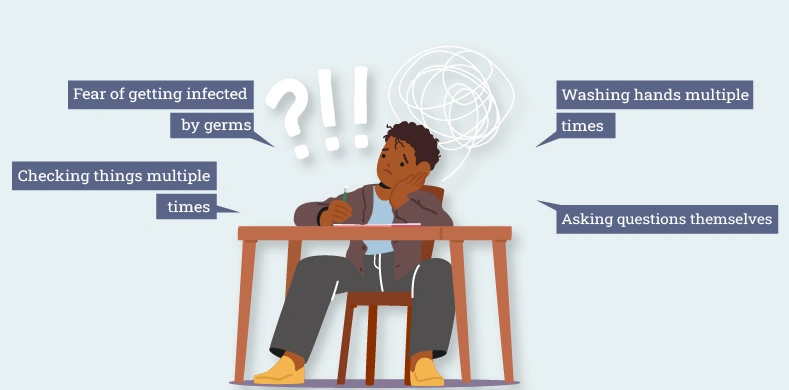
Always remember that if a child is affected by OCD, then it does not mean that they are the only sufferers, as it also impacts their entire family. Whatever the situation, it’s the sole responsibility of each parent or caregiver to help their child get rid of OCD and live an OCD-free life. The top ways to manage your child’s OCD at home are as follows:
1. Educate Yourself Regarding OCD
You can only help your child manage OCD if you are completely aware of each aspect of OCD. So learn what OCD is, how it affects your child, and what the best ways are that you can use to assist your child in overcoming the OCD. This will also help you to avoid all the myths or misconceptions that people have about OCD.
2. Educate Your Child, Too
You should also teach your child everything about OCD. So, before doing anything, they first think about what is bad and can result in their OCD symptoms and associated behavior. Moreover, in those cases when you are not there for their support, they think smartly and make well-informed decisions about their behavior.
3. Identify the Signs Early
As a parent, you should keep a constant eye on your child’s behavior to identify the early warning signs or symptoms of OCD. Your child may look normal, but deep inside, your child is battling with intrusive thoughts and compulsive behavior. The following are the most common signs that you can see if your child is experiencing OCD:
- Difficulty in completing easy and simple tasks
- Taking more time to complete the tasks or projects
- Severe emotional instability
- Negative changes in diet or eating patterns
4. Encourage Your Child to Share
Most of the children usually hide their feelings, emotions, and thoughts. They think that others will judge them or criticize them. But teach them that there is no need to hide their feelings. Whatever they feel, they can share with them. So they can find the best solutions to eradicate the symptoms of OCD.
5. Avoid Accommodating OCD
Do not participate in those activities or rituals that your child is already doing due to OCD. Make sure that you are not accommodating OCD by keeping in mind that you never have to make your child sad or angry with your instructions. Guide your child in a very polite way to change their negative behavior instead of changing your behavior that negatively impacts them, and urge them to continue their OCD rituals.
You should never make the following accommodations.
- Show your love to your child within limits. For example, if you are giving your child 10 kisses instead of just one, then avoid this.
- You are changing your clothes for only one reason that your child is saying to you and telling you that if you don’t do that, they will be angry with you.
- Giving your child reassurance multiple times
- Planning any trip on the instructions of your child, even if they have a special test on that day
- Cleaning a space if your child says to you that they have to sit there
- Give your child permission to use separate soaps or body washes, even if all the family members are using the same one. Never allow your child to be the only person to use the washroom at home.
- Recleaning the child’s dishes or utensils if he or she is affected
6. Praise Your Child for Self-Efforts
OCD management is easy, as it is quite challenging for both parents and children. But if your child is making some effort to manage the OCD symptoms, then as a parent, it’s your first responsibility to praise your child. By doing this, you can raise the morale and confidence of your child. Moreover, you don’t need to give them some expensive gifts. Your few simple, clear, and concise statements are enough like
‘’ Well done! I’m proud of you, you’re working hard in tackling your OCD.
‘’ You did a very good job’’
However, make sure that you are not repeating such sentences in front of your child, as it will turn out to be excessive reassurance.
When you praise your child’s efforts or give them rewards then they also focus more on challenging their OCD. What you need to do is simply guide your child that they will have to achieve the goal that you have set, and then they will have a reward.
For example:
- You can allow them to play their favorite game for a specific period
- You can arrange a trip or adventure so they have great fun
- Likewise, you can also go to the cinema and watch your favorite movie
7. Set Some Limits
By setting some boundaries, you can also help your child deal with OCD. Although it’s hard, it can surely work and help your child.
For example:
Tell your child that first, change your clothes, and then enter your room. Say to them that I know it’s hard for you, but this is due to your OCD, and by doing this, you can recover. Likewise also tells them that I’m not going to change my clothes before I enter your room.
Initially, your child will have difficulty following your set limits, and there is also a probability that they will show anger outbursts. But with time, your child will get used to it.
8. Build Coping Skills
Teach your child that they have to learn some coping skills to manage their OCD symptoms. Encourage them to learn how they can deal with their anxious thoughts instead of just relying on you or always finding you for help. Teach your child all the skills so they can independently confront their OCD thoughts without seeking help.
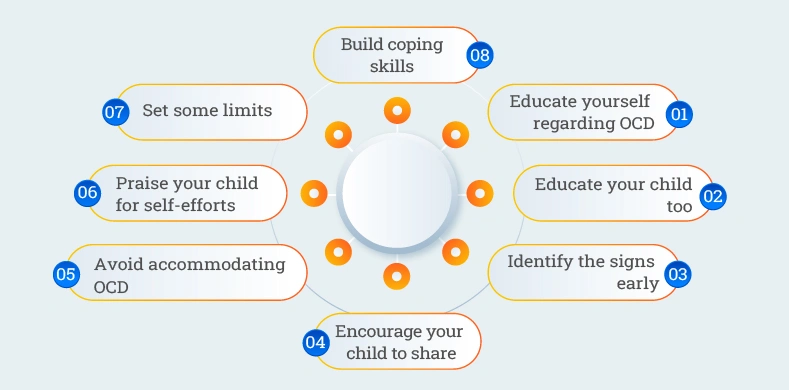
9. Encourage Your Child to Face Fear
Train your child to face the fears with courage and confidence instead of running away from them. Tell your child that all these challenges are nothing in front of them and they have all the capabilities to navigate them. Moreover, also reminds them of the skills that they have learned from them. Your ultimate goal should be to make them more efficient in using their skills and traversing all the OCD challenges.
10. Create a Supportive Environment
Always try to create a secure, friendly, and supportive environment where your child feels free to speak their heart out. They do not encounter any obstacle that prevents them from sharing their mental health issues and finding the best solutions for their existing mental issues, such as OCD.
11. Don’t Consider Your Child Oppositional
If a child is showing defiant behavior, then parents usually get angry with them. They feel that they are just opposing or denying your instructions, but in reality, it is their OCD. Instead of battling with them or showing your anger over them, deal with them with care and support them so they can easily overcome their mental issue.
12. Stay Consistent
Tell your child that they have to stay consistent throughout their journey of recovery. Ensure them that the more they remain consistent and show patience, the more rapidly they will escape from the complex maze of OCD.
13. Seek the Professional Help
If at any point, you feel that your child’s OCD symptoms are getting worse or you are unsure how to implement the most effective and tailored strategies for your child, then don’t be afraid to get help from professional mental health experts.
Medications and Therapy
Experts employ varied treatment plans that include medications and psychotherapy. For managing the symptoms of OCD, experts mainly prescribe selective serotonin reuptake inhibitors (SSRIs). Likewise, they employ cognitive behavioral therapy to identify intrusive thoughts and then make significant alterations in them accordingly.
14. Take Part in Your Child’s OCD Treatment
Do not leave everything to experts, as you should also be a companion to your child in their journey of mental wellness. You can also learn from experts how you can help your child.
Empower Your Child’s Mental Health at Children’s Psych.
Children Psych is a renowned platform where you can find the best psychiatric services for children and adolescents. At Children Psych, we are committed to helping your child and adolescent get rid of their mental issues and shaping their future.
We have a team of expert child psychiatric nurse practitioners who have expertise in treating all the common psychiatric issues, such as anxiety, depression, OCD, ADHD, and bipolar disorder, etc. They develop personalized treatment plans that suit the mental health requirements of each child and adolescent.
So What are You Waiting for?
Book an appointment with our experts and get the best mental health solutions for your child or adolescent.
Consult Now!
Frequently Asked Questions
What are the triggers of OCD in a child?
Several genetic and environmental factors act as triggers of OCD in children.
What are the ways to help a child with OCD tics?
In case of OCD tics in children, the best strategy you can adopt is to avoid reacting to them.
What is the best way to help a child deal with intrusive thoughts?
Tell your children that whenever they feel intrusive thoughts in their mind, focus on the positive thoughts and memories and the significant ways to alter them.
